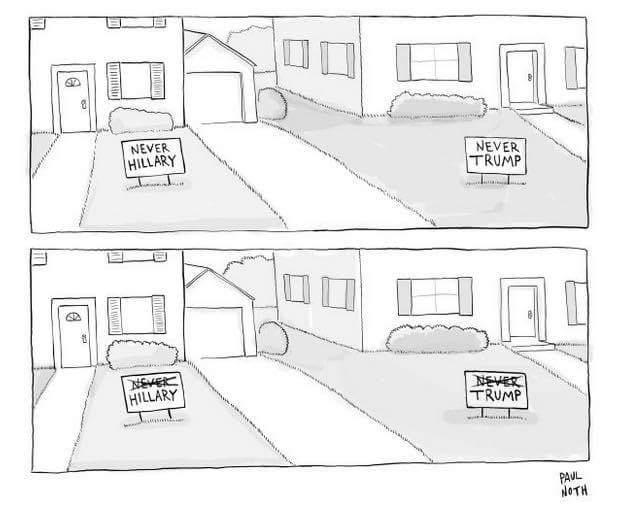
Tired of your friends fighting? Are your friends mad at each other over electoral politics these days? Mine are.
I recently talked to Sam Husseini, the Institute for Public Accuracy’s well-known media watchdog and friend to many a political journalist and critic, about his project, VotePact.org. VotePact proposes that those who don’t feel great about either Hillary Clinton or Donald Trump – but are nevertheless worried that one candidate may be worse than the other – enter into bilateral voting agreements with those on the other side of the aisle. I vote for Jill Stein, while my conservative neighbor votes for Gary Johnson. We’ve negated the bonus either Trump or Clinton receives from a third party vote by depriving both of them a vote. Bam! We’re now a tiny, destabilizing bump in the two-party system, and neither major candidate is better off.
Husseini distinguishes VotePact from the “vote-swapping” movement of recent elections – a more legally tenuous strategy of trading votes in swing states for votes in “safe” states. The goal of VotePact is different: to negate votes for both major party candidates in favor of two alternative candidates. The message is different. “Voteswapping got a ton of media in 2000, exactly because it didn’t threaten the system like VotePact does,” Sam says.
VotePact’s strategy threatens the system because, freed from the burden of not helping some evil candidate get elected, voters may lend credibility-inducing boosts to the Green Party’s Jill Stein, the Libertarians’ Gary Johnson, the Socialist Party’s Mimi Soltysik, or others. These candidates are often five to 10 percentage points away from crossing electoral thresholds to matching funds, inclusion in debates and other hurdles that favor the duopoly. For voters cautiously exploring alternatives, this seems like a win-win.
Playfully likening right- and left-oriented voters to “Elves and Dwarves” – normally enemies uniting to fight against Mordor – Sam says this kind of political pact is really about talking to our neighbors. “The most radical leftist probably has a neighbor, relative, coworker who’s voted Republican,” he says. “We have to be mature enough to realize people we disagree with have a brain and a heart like we do even if we think they’re not using either properly.”
When he said that, it occurred to me that this is more than just a tactical project. VotePact is a cooperation game.
Game Theory and Vulnerability
The “Stag Hunt” is a game theory hypothetical. Two or more people go hunting. They can hunt a big buck stag together, or catch hares by themselves. They have to cooperate to get the stag. And if, having opted to track the stag, they then fail to cooperate, nobody will get anything.
I like this hypo because it shows the rewards of not only cooperation, but prerequisite trust. Trust is hard.
There’s a refreshing acknowledgment of vulnerability in VotePact’s proposal. For those rendered insecure by the heavy-handed fear tactics of lesser-evilism, “VotePact gets them freedom from fear, so they can actually vote their preference,” Sam says.
Of course, it’s not that simple. The stag hunt hypo has additional details. In some versions, the hunters lay a trap and wait for the stag, sometimes for hours. They haven't seen the stag all day, though they know it should show up. While they wait, they see hares run along the same path. If one of them jumps and kills the hare, they ruin the trap – that's a small dinner for the one hunter and nothing for anyone else. The hunters wonder whether someone else will kill the hare. We all need to eat. Anyone’s insecurity about whether they will eat could ruin the collective endeavor.
Our political choices are like that, Sam says: We know that some carefully planned, rational collective action will produce good results, but here in the moment, it’s scary and we don’t always know who to trust. “People love it in [the Matrix] when Neo makes a deal with the machines – but making a deal like that requires guts.”
Knowing How (and What) to Fight
I can imagine some people’s reactions as they read this. They’ll find themselves breathing harder, irritated by how Sam’s arguments possess a self-contained logic that doesn’t grasp what’s intuitively obvious to them: that what is needed is not a pact that robs a vote from each major candidate, but a pact to add to the number of votes for their candidate, because if their candidate doesn’t win things will be really, really bad.
But there’s something to be said for the radical conversational potential of reaching across the aisle and inviting political opponents to bust the system together. Sam contrasts this to the national electoral conversation “driven by self-interested candidates and establishment media. They have ‘everything to sell and nothing to tell.’ There isn’t actual, thoughtful conversation, speaking and listening by people to people.”
Nor has the electoral conversation among my friends been particularly thoughtful or listening-oriented; to be honest it’s been painful and depressing, a reminder of how the challenges of life and the various layers of privilege we negotiate threaten to harden us ideologically. And there’s been way too much shutting down of dissenting points of view, lots of lecturing and shaming, and minimization of the issues or values that motivate people to vote for more radical candidates.
To hell with all that, VotePact insists. “People avoid talking about things they disagree about because they don't want to upset, or they do the system’s work by screaming at each other,” Sam says. “We need to be able to have a bond with someone even after learning how we disagree. Out of that dialogue, people might change for the better.”
Let’s assume the enemy is not Trump or Clinton, but the system that makes narcissistic big money presidential campaigns possible in the first place – a system of corporate crony capitalism and its human pathologies and insecurities. That system is extremely powerful. “When you’re weak in many ways and your opponent is strong,” Sam says, “you use Jujutsu (a method for defeating heavily armed, armored opponents using small weapons or no weapons at all) and you use your opponents’ strength against them. The system obsesses over the election, it keeps people in their partisan boxes using fear and hatred. Let’s use that against them.”
“Brick by brick, this wall could fall – if we’re seriously strategic,” he adds. And willing to put trust over fear, I think.
Matt Stannard is policy director of Commonomics USA and is on the board of the Public Banking Institute. His commentary here does not reflect the views of either organization.
3 WAYS TO SHOW YOUR SUPPORT
- Log in to post comments


















Comments
DH Fabian replied on
In the end...
No, all that's happening is that the middle class are now experiencing the fall-out of decades of nurturing a culture that has profoundly divided and subdivided us by class and race, religion and ideology. Think of it as "trickle-up anxiety."
We could spend the next four months debating whether the Dem or GOP candidate is the lesser of the evils, or whether people should just pick one instead of voting third party or withholding their votes, but would reach no agreement.
In the end, Democrats already lost, simply because they worked longer and harder to split their own voting base, alienating much of that base. For those who aren't as well-off as middle class, Democrats have been the greater of the evils. Unless the party bosses replace him (which is highly unlikely), Trump will be elected, and it would be wise for individuals and families to begin preparing for the most likely consequences.